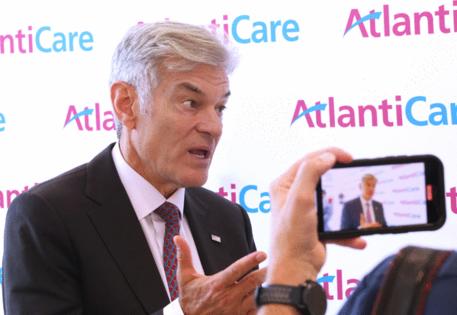Commentary: Stop waiting, start building -- A national call to modernize health care
Published in Op Eds
In nearly every part of modern life, technology works for us. You can check in for a flight with your phone, track your heart rate in real time or get personalized grocery suggestions based on your habits.
But when it comes to managing your health? You’re often stuck printing records, repeating your medical history at every new appointment and filling out the same forms again and again. That’s not just frustrating; it’s dangerously unacceptable.
Leaders from across health care and technology recently gathered at the White House with a shared purpose: to fix what’s broken in health tech and to build what works. This wasn’t just a showcase, it was a signal. It’s time to stop waiting and time to start building.
I know what’s at stake because I’ve lived it. My daughter Morgan has a rare disease. She sees 12 doctors and takes 21 medications. For more than a decade, she’s navigated a maze of disconnected systems, repeated paperwork and inconsistent records. In between short appointments every few months, she gets almost no daily feedback — no smart tools to help manage her symptoms, no tailored advice, no real-time coordination across providers.
Her smartwatch encourages movement, but it doesn’t know that Morgan lives with a debilitating condition. It doesn’t help her decide when to rest instead of pushing through, or when to take one of her as-needed medications. She doesn’t get the same personalized, intuitive feedback we expect in almost every other part of life. And she should.
Recently, Morgan uploaded her medical records into an AI assistant, just to see what it would say. What it found stunned us: a subtle but critical discrepancy in her diagnoses that could make her eligible for a clinical trial — a trial that could offer the first real hope we’ve had in more than 15 years.
That’s the promise of connected data and smart tools when they work. But right now, they mostly don’t. The federal government has made major investments in digitizing health care. But digitization alone isn’t enough.
The Centers for Medicare & Medicaid Services, under the leadership of Dr. Mehmet Oz, has focused on building the foundational infrastructure the private sector needs to innovate. That includes collaboration with the U.S. DOGE Service to finally create a long-overdue national provider directory — a digital map for health care — so systems can talk to each other in real time and so patients can receive connected care.
Right now, there’s no single, trusted source of up-to-date information about providers — where they practice, what specialties they offer, or how to connect to them. Every health insurance plan requires providers to submit the same information separately, often dozens of times across different networks. The result? More than $2.7 billion in wasted administrative effort each year, according to the Council for Affordable Quality Healthcare. And without knowing where or how to send data that other providers need, medical offices can’t share it. A smart provider directory is the first step to fixing that.
We’re also modernizing how Medicare and Medicaid data are shared, with security and privacy built into every step. And we are clearing the path for tools that help patients manage care with confidence — tools that feel as seamless, smart and human as the apps we already trust in our daily lives. And here’s what’s important: This is not a federal database of patient health information. It is a network of providers, with patient privacy, consent and transparency built in from the start. Individuals remain in control of their data, deciding when, how and with whom it is shared.
But the federal government can’t do this alone. The apps and services that turn raw data into information for daily decisions must come from the private sector: clinicians, developers, caregivers and startups.
That is why this effort matters. We’re not only asking for ideas. We’re also asking for action. We’re asking companies to make real commitments — to kill the clipboard and build secure data-sharing networks. To develop tools that deliver real outcomes and give people a health care experience that’s finally as smart, seamless and personalized as the consumer products in their lives.
Imagine scanning a QR code at your doctor’s office and instantly sharing your health history, like scanning your boarding pass before a flight. Imagine having an AI assistant that knows your care plan and helps you manage risks, flare-ups, medications and appointments. Imagine getting informed responses to your worries 24/7 wherever you are. That’s not science fiction. That’s what health care can and should look like.
We’ve waited long enough. Let’s stop accepting what’s broken and start building what works. The right data at the right time can mean the difference between confusion and clarity, decline and healing, loss and hope. Let’s stop faxing and let’s kill the clipboard.
The time is now. Are you in? Join the movement at http://cms.gov/health-tech-ecosystem.
____
Amy Gleason is a strategic advisor to the Department of Health and Human Services and the Centers for Medicare & Medicaid Services. She is also the acting administrator of the U.S. DOGE Service.
_____
©2025 Los Angeles Times. Visit at latimes.com. Distributed by Tribune Content Agency, LLC.
























































Comments